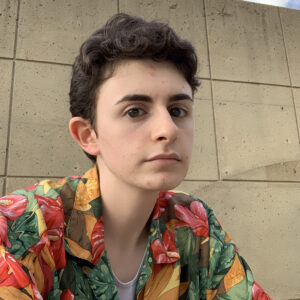What’s the most Jewish day of the week? If I gambled, I’d bet money that you’re now thinking about either Friday or Saturday. Shabbat, after all, is the holiest day of the week, and the value of keeping it so is literally written into the Ten Commandments. More importantly, if you’re like me (a full-time student/part-time barista at a secular college), your work-week runs on a Monday-Friday schedule. Friday evening and Saturday afternoon might be the only time that you can find a moment to bake challah, sit down to catch up with loved ones, or step away from your deadlines to rest and reflect.
So, if you read my question and immediately thought of Shabbat, I’m with you – or, I used to be. Amidst my overscheduled and generally non-Jewish worlds, Fridays have often been, through my remembrance of the Sabbath, the de facto time that I get to remember, well, my Judaism as a whole. On six days, we shall work, and on the seventh, we shall Jew.
But this year, during my fellowship with New Voices and Judaism Unbound, I found my Judaism cropping up in unexpected places, and on unexpected days. On what had previously felt like maybe the least Jewish day of the week (Wednesdays, of course), I would rush home from my afternoon classes to log onto my weekly one-on-one with Lex Rofeberg, my supervisor and the Senior Jewish Educator at Judaism Unbound.
Lex and I began each weekly meeting with a d’var Torah; we’d switch off every week, so that one of us would come to the Zoom room prepared to spend a minute or two interpreting, asking questions about, or (to my surprise and delight) criticizing some piece of the week’s portion. Having a reason to regularly pay a visit to Sefaria was grounding – even in the middle of my week, I was able to remember my Jewish practice and spend a little time parsing a parshah. I grew to really value the time I spent thinking about these books and their many translations.
But as much as I learned from my own close readings for these d’vrei Torah, the most valuable lessons I am taking away from these few minutes of my week came from seeing the Torah through Lex’s eyes.
I have always studied the five books of Moses as the site where Judaism begins: I have been taught to imagine our entire canon, not to mention the countless practices built around it, emanating out of this original text. If, for example, Shabbat is the most Jewish day, then it must be so because the Torah says so. Just look at the format of a page of Talmud! Torah is the core, the center, around which Judaism revolves.
But what if it wasn’t?
A month or so into the fellowship, Lex mentioned the Book of Jubilees – a retelling of the events of the books of Genesis and Exodus that begins with Moses at Mount Sinai. The Book of Jubilees is generally not recognized as a part of the Jewish canon (although it is considered canonical by Beta Israel Jews). What if, Lex asked, the Book of Jubilees had made it? What might our Judaism look like today if we had chosen to begin our story with tablets and mountains instead of apples and snakes?
Lex kept looking backwards as we moved forwards through the weeks. When I asked about Azazel, a rogue name that appears in Achrei Mot, I learned about another hint to a form of Jewish belief not-quite-enshrined in the Torah. In another world, we might still have rituals remembering specific Nephilim. In a Judaism where Azazel remains prominent, we might have canonized the Book of Enoch instead of Jubilees. But in the Judaism we know, the Judaism that was passed on, Azazel is only a name.
In Kedoshim, with the core of what we now know as the Holiness Code, Lex found another question. What if instead of the Ten Commandments, we learned about Leviticus 19 and 20? What might the Religious School art projects of that Judaism look like, without the construction paper tablets I know so well?
The way Lex read Torah blew my mind. Looking backwards in this way made me think, for the first time, about the Torah not as the start of Judaism, but as a kind of map of its history – a place to begin tracing backwards the paths of these vestigial figures, decentered laws, and unused origin stories. A product of Judaisms past. I started to internalize this way of looking at Torah, which carries with it another revelation: for every piece of Jewish canon, midrash, or media I’ve learned, there was a time when someone chose to favor that form of Judaism over countless others.
Working with Judaism Unbound helped me look to the past, and by doing so I turned my eye towards the moments where someone, somewhere, decided on the Judaism they wanted to see in the world.
This, of course, brings me to New Voices and my fellowship cohort. New Voices is all about imagining Jewish futures, with a trifold mission to “cultivate the next generation of Jewish journalists, create media that speaks to young Jews, and empower Jewish students to hold accountable the institutions that raised them.” Coming off of my Wednesdays with Lex, I spent many Friday mornings at fellowship meetings with a small group of these young, empowered, Jewish journalists, organized and led by New Voices Editor in Chief Rena Yehuda Newman. The many Zoom chat quips, six-minute writing exercises, and article drafts that these fellows shared taught me to ask even more questions that changed my framework for approaching Judaism.
More often than not, these questions looked to the future, into the millions of Judaisms that still might be born. Could we create a Judaism where the culture of Jewish youth groups prioritizes consent and safety? What about a truly “multirooted” Judaism that embraces solidarity, rejects borders, and is grateful to “the undefinables” that carry interfaith and multicultural identities? Another idea – could the ”People of the Book” return to the traditions of oral history that formed our canon? Jewish futurisms exploded out of this group of fellows, setting my brain alight with still more questions. What would these Jewish futures look like? What would our canon become, and what would new Jewish media look like? Maybe most importantly, what choices can we make to bring these Judaisms into the present?
This year, Rena Yehuda has made it a point to remind me of their belief that what I have to say matters, that my voice has something to add to a dynamic and beautiful world of Jewish stories, Jewish media, Jewish canon. Their confidence in the importance of my voice (and in the journalistic, academic, or creative voice of every New Voices writer) was something I’ve had a hard time internalizing, especially amidst missed deadlines and stalled drafts.
But by learning to look backwards and forwards, by learning to see myself in the middle of a chain of choices, I think I’m getting closer to believing that my voice matters – and, in a broader sense, I’m learning to believe in the power of Jewish media.
If you’ll forgive a journey back to the opening paragraph, I’ve struggled to really understand the power or potential of my choices in a world where I think of Shabbat as my day to be Jewish. If Shabbat is the core of my Judaism, because capitalism and the Ten Commandments tell me it should be, then Judaism is an end result that must be kept holy and apart.
If I practice Wednesday Judaism, I stay conscious of my role smack-dab in the middle of the Jewish past and future. I have to look back, I have to look forward. I get to make choices.
I am so honored to have spent the year learning from Rena Yehuda, Lex & Dan, and the other fellows in my cohort. These Jews throw away concerns with continuity, toss out ideas of one sacred and static tradition, They deeply engage with Jewish practice and tradition as a site of criticizing, creating, and choosing. Without exception, they have taught me to look back to the decentered Jewish pasts (19th century Balkan silhouettes worn by women of many faiths, oral traditions that once kept the entire Talmud, books of seventh sons and human-angels) as they look forward, asking isn’t it about time we brought that back, isn’t it about time we made this our own?
So I’m leaving this fellowship with a challenge to myself: I want to keep making Wednesday the most Jewish day of my week (although Shabbat will remain the holiest). I want to find all the places where I assumed my Jewish practice starts, and work backward from there. I want to imagine the Judaisms that might have been, find the ones I want to try, and work with others to create the ones we need to keep. If you like this challenge, take it. Make it yours.

